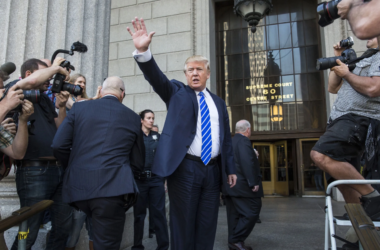In a formidable display of opposition, Argentina’s largest union initiated a 12-hour strike, bringing tens of thousands of workers to the streets of Buenos Aires to protest against the stringent economic austerity measures and reforms introduced by the new libertarian President, Javier Milei. The widespread action, impacting key sectors such as transport, banks, and public services, represents the most significant backlash against Milei’s policies since he assumed office a month ago, vowing to address the nation’s economic woes marked by 211% inflation and substantial debt.
Coordinated by the influential umbrella union, the General Confederation of Labor (CGT), the strike serves as a robust challenge to Milei’s plans for spending cuts and privatization. The CGT orchestrated the 12-hour work stoppage and mass demonstrations, reflecting the deep discontent among workers regarding Milei’s economic reforms. Union leaders, including Pablo Moyano of the powerful truckers union, criticized Milei’s labor reform proposals, accusing the government of undermining workers’ rights.
President Milei’s reform agenda includes an “omnibus” bill currently under consideration in Congress and a “mega-decree” aimed at deregulating the economy. These measures, designed to address Argentina’s economic challenges, face staunch opposition from unions and political adversaries who argue that the reforms threaten workers’ rights and exacerbate social inequality.
Despite the widespread strikes affecting various sectors, Milei’s government remains resolute in its commitment to pursuing the proposed reforms. The government’s determination to implement spending cuts and initiate privatization has intensified the clash with labor unions, leading to a standoff that has disrupted essential services and impacted daily life for citizens.
The strikes, commencing at noon local time, had a notable impact on transportation, banks, hospitals, and public services. Local airlines reported the cancellation of hundreds of flights, underscoring the magnitude of the union-led protest against Milei’s economic policies. The General Confederation of Labor (CGT) utilized legal channels to temporarily suspend certain labor-related measures outlined in Milei’s decree.
Simultaneously, an “omnibus” bill, a cornerstone of Milei’s reform agenda, advanced through a committee in the lower chamber of deputies. The bill faces substantial opposition from the powerful Peronist opposition bloc, highlighting the political divisions that Milei must navigate as he seeks to implement sweeping economic changes.
Javier Milei, an economist and former TV pundit who secured an unexpected election victory last year, faces the delicate task of stabilizing Argentina’s economy, marked by triple-digit inflation and a deep fiscal deficit. His commitment to austerity measures is justified by the government as a necessary response to years of overspending, resulting in substantial debts to both local and international creditors, including a precarious $44 billion deal with the International Monetary Fund.
Responding to the union-led protests, Milei’s security minister and former presidential election rival Patricia Bullrich dismissed the opposition as “mafia unionists, poverty managers, complicit judges, and corrupt politicians” protecting their privileges. Bullrich emphasized that the government remains undeterred by strikes and threats, portraying the reforms as a democratic choice to bring about necessary societal changes.








